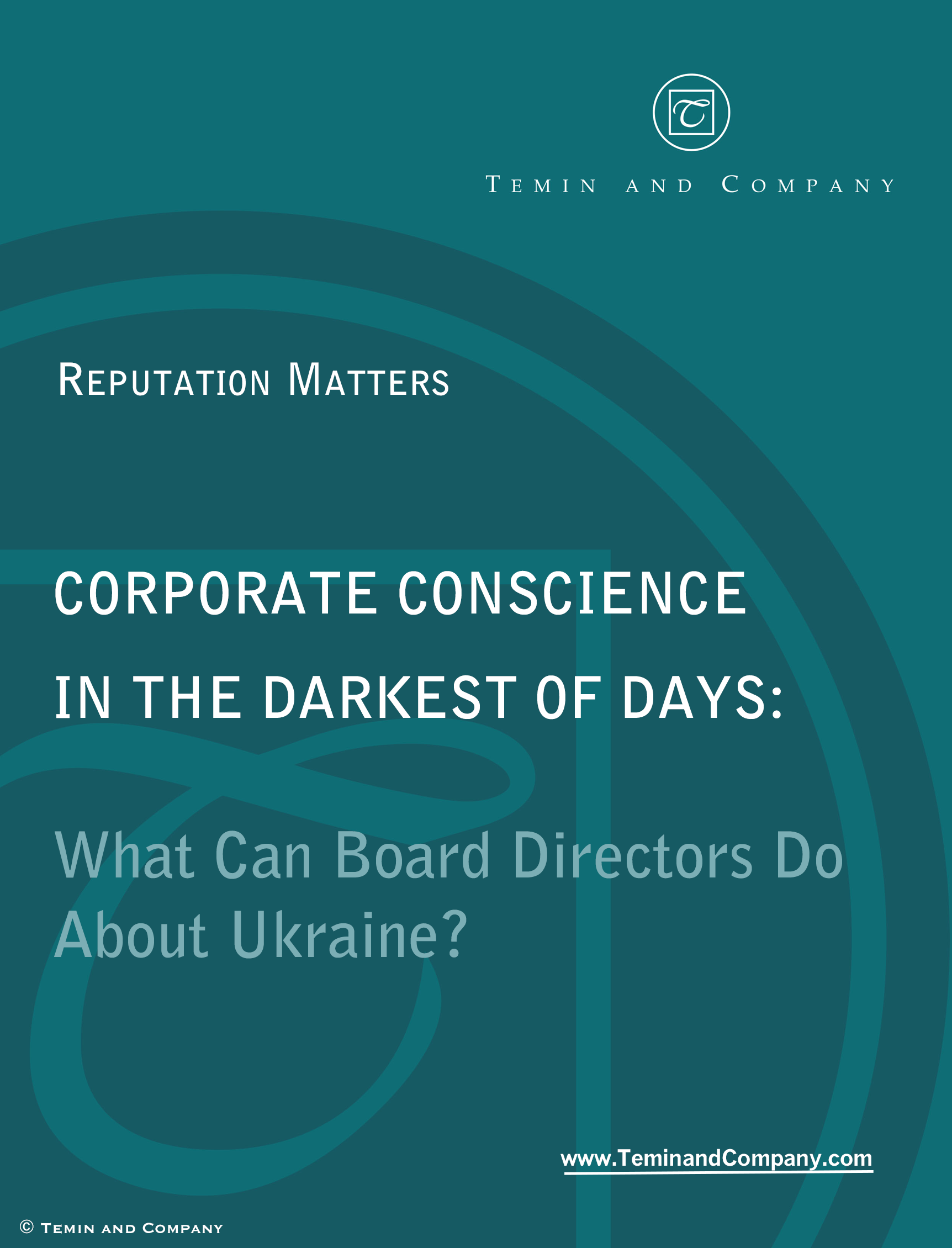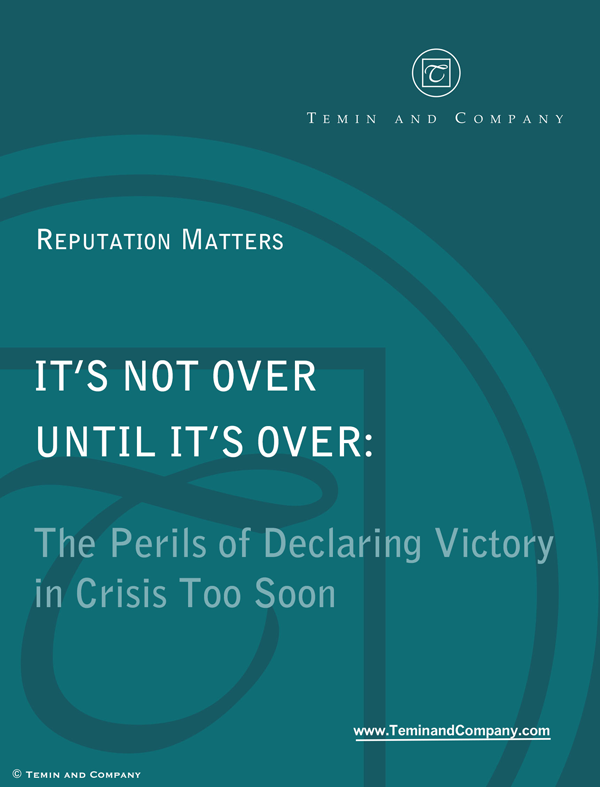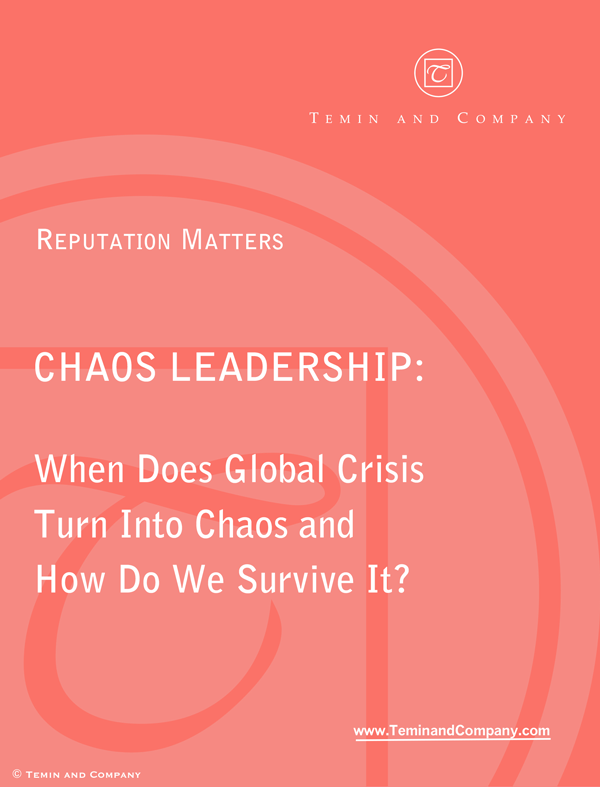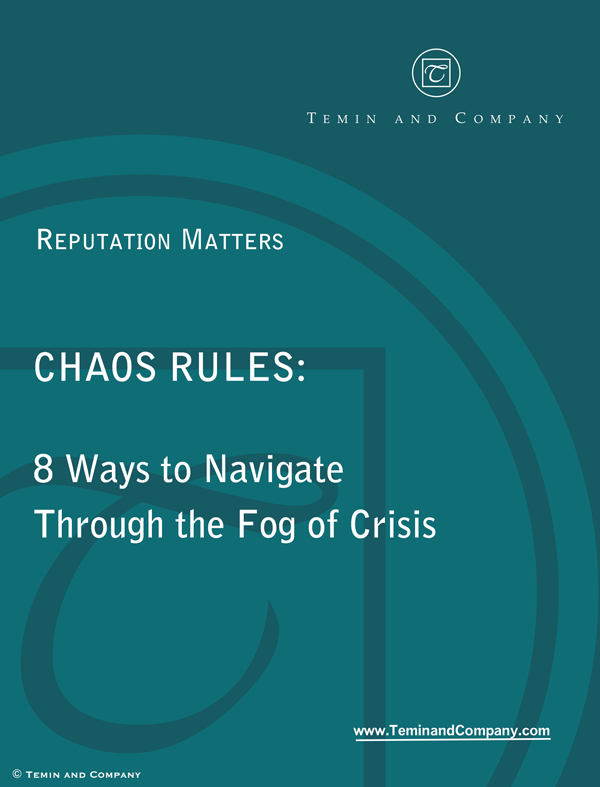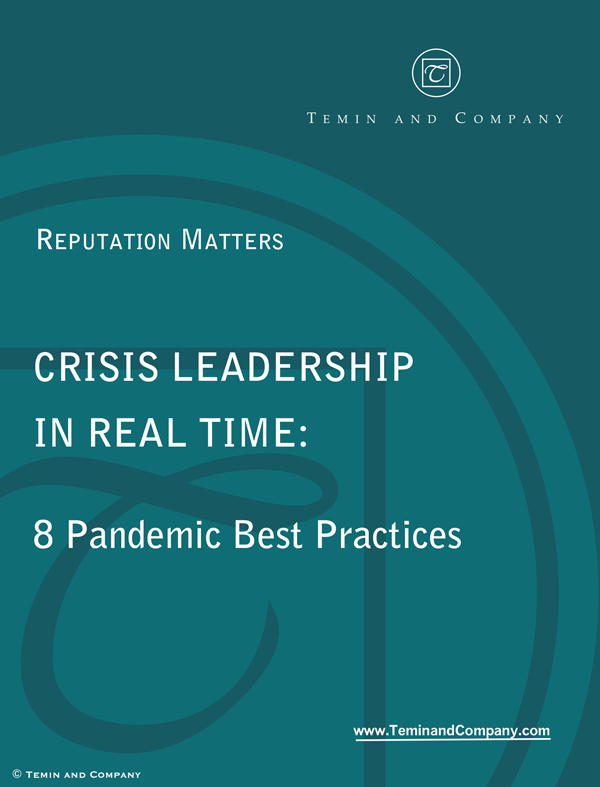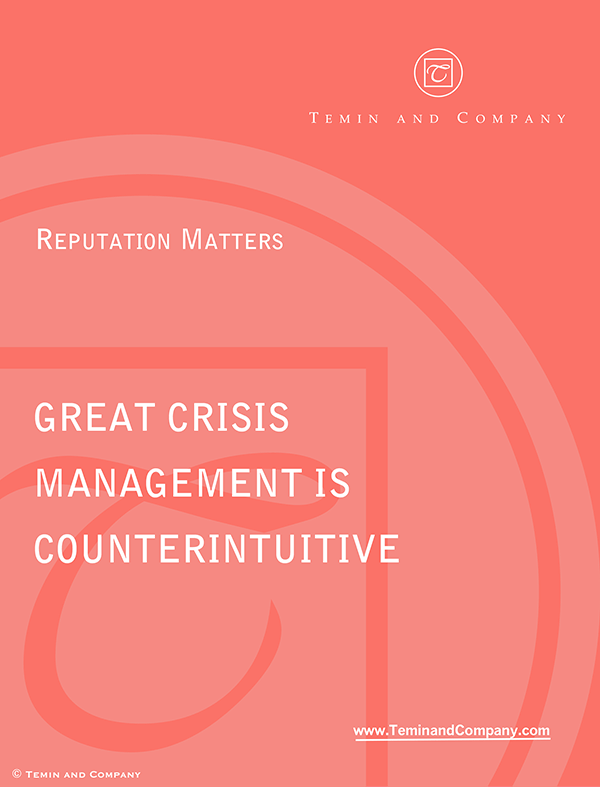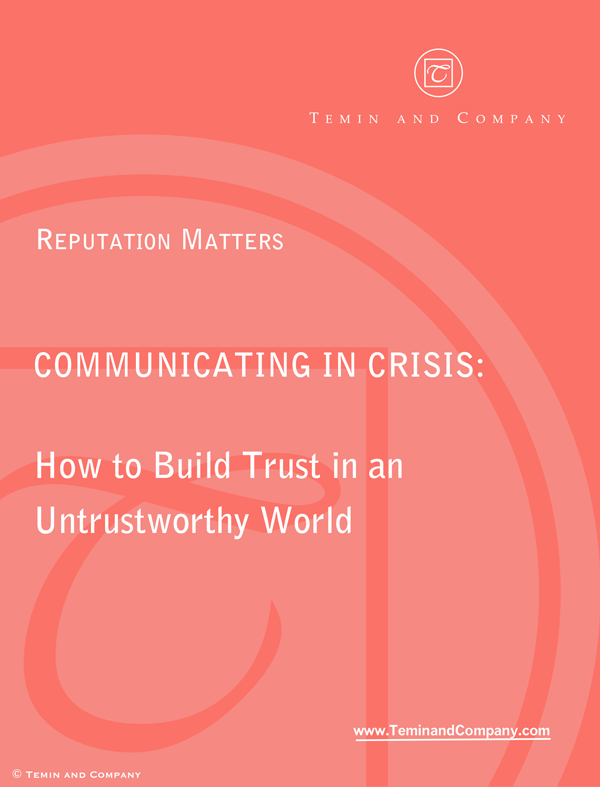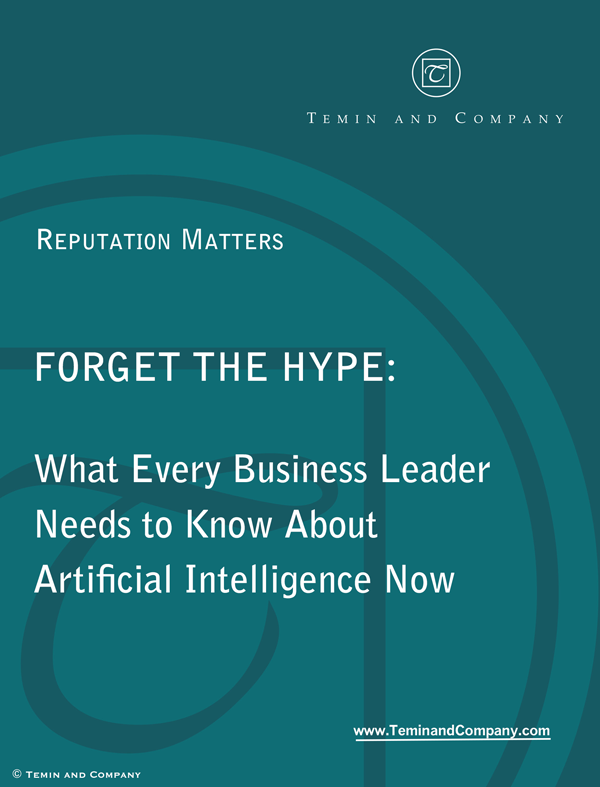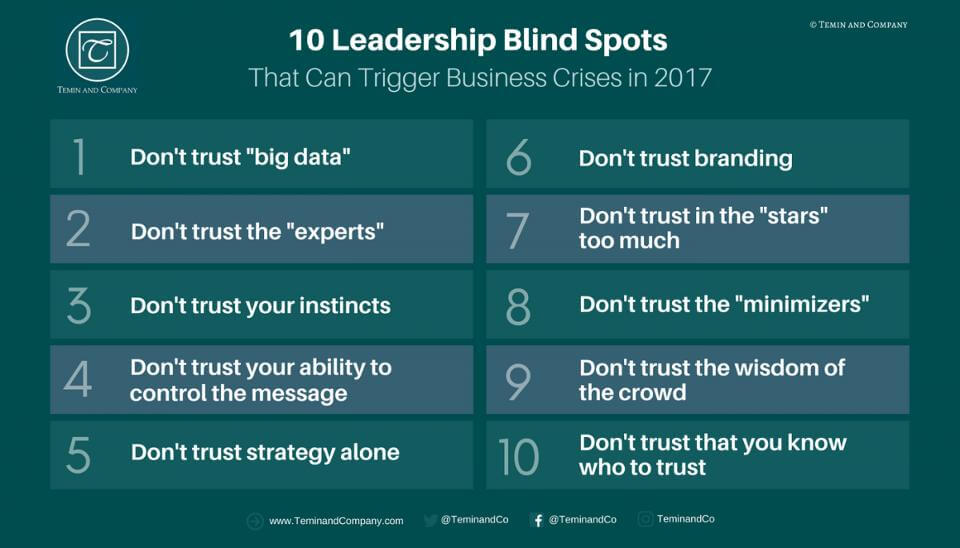Thought Leadership
White Papers»
"Reputation Matters" White Papers seek to offer deeper insight on a wide range of topics we help clients address.
Specialists in marketing through ideas, information, and insight, Temin and Company turns clients’ intellectual capital into true thought leadership.
We also seek to practice what we preach.
Temin and Company’s own thought leadership includes white papers, yearly client letters and podcasts, published articles, a Forbes.com column – Reputation Matters, Huffington Post and American Banker articles, and appearances in other news articles and broadcasts.
Further, Davia Temin is a frequent public speaker and moderator – for clients, their own client events, and their “high potential” training programs. She also presents regularly at CEO conferences, and has developed a range of “Crisis Game” role play simulations to prepare CEOs, Boards, and client companies for real-life crisis situations.
Uber CEO Kalanick’s Resignation Is Not The Best Answer
Leadership, “Reputation Matters,” Forbes, June 21, 2017
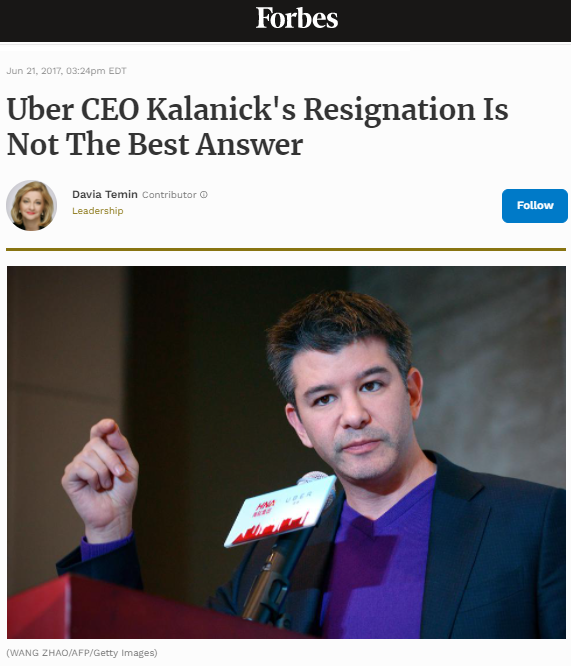
I am sad that Travis Kalanick had to resign. As news of the Uber CEO’s resignation is digested by the world’s media analysts and leadership pundits, I would like to put forth a contrarian point of view – especially coming from such an outspoken advocate of gender equity in organizations. I do not think this is the biggest win that we who are interested in a bias and harassment-free workplace could have hoped for. Not by a long-shot.
Reformation vs. Resignation
Kalanick’s reformation would have been such a more powerful and optimistic story. It would have shown that, yes, personal transformation is possible, even among tone-deaf, frat-boy, start-up executives. And it could have shown that once a leader is made to, and allowed to, grow up, he or she can own it, and then transform a culture. […read more]
Dear Uber, Here Are 11 Ways You Can Fix Your Culture To Support Women Right Now
Leadership, “Reputation Matters,” Forbes, June 18, 2017
To rephrase Madeleine Albright: There is a special place in heaven for men — and women — who help other women. But for Uber, and so many other organizations, their cultures are in need of an essential transformation before they even begin to find their place in the firmament.
Of course Uber is not the only company to sport a “bro” culture that can be antithetical to women executives’ presence, progress, and well-being. They’re just one of the most flagrant.
So, as Arianna Huffington and Eric Holder began to publicly reign in the executive office, and board, I began to think of what it would really take for Uber, and other organizations, to immediately empower, support and profit from the women in their workforce. I decided that this, drawn from over 25 years’ experience as a coach, reputation manager, and CEO dedicated to promoting women and girls’ leadership at every level, would be the topic of my remarks: 11 Ways To Support the Women in Your Organization and Life. I am pleased to share it with you today. […read more]
How United Became The World’s Most Hated Airline In One Day
Leadership, “Reputation Matters,” Forbes, January 18, 2017
It’s no longer crisis as usual for United Airlines, or anyone else. Live social media posting has changed what you can get away with in a crisis — forever.
It used to be that if an airline made as monumental a mistake as United Airlines just did by causing a paying customer who had done nothing wrong to be dragged off a plane screaming, bloodying him up along the way in front of all his fellow passengers, they might still have gotten away with it.
After all, on a plane, passengers were basically incommunicado, so people couldn’t have protested easily, and they might not have been believed, especially if the airline denied it or called it an “overreaction.” The populace tends to believe its leaders in these situations, if compelling evidence to the contrary doesn’t exist. It rather makes one wonder about how many times such a debacle has happened before, and just not been caught on video.
But today all that changed. Live footage of the assault of an innocent passenger by security personnel was captured and immediately posted on social media around the world, instantly making United one of the most hated companies in the world. […read more]
10 Leadership Blind Spots That Can Trigger Business Crises In 2017
Leadership, “Reputation Matters,” Forbes, January 18, 2017
When you look closely at what triggers crises in organizations, you often see that there is a major leadership oversight or blind spot that has allowed the crisis to exist in the first place – and then grow, unrecognized, until it’s too late. Just as many leaders want to be perceived as trustworthy in a rapidly changing environment, leaders themselves need to be aware of who and what they are trusting. Misplaced trust is a clear precursor to trouble.
As businesses look toward the coming year, here is a deeper dive into common crisis triggers, so that management teams and boards can recognize hidden risks and danger zones within their organizations. […read more]
The 9 Worst Ways To Brand Yourself
Leadership, “Reputation Matters” Forbes, January 6, 2017
Are you getting tired of all the content-less “content marketing” that pervades the internet in order to “brand” professionals as thought leaders? I know that a lot of the HR heads and CEOs I work with are.
They see this explosion of self-branding “lite” as insubstantial and overly self-promotional. And while the internet does afford everyone a platform to air their thoughts, when done poorly it can backfire and actually take away from your professional reputation and brand equity, instead of building it up.
Unlike a celebrity profile, an executive reputation or brand is forged when you truly stand for something and the totality of your work product, presence, writing, insight, and professional and personal actions support that stance. Whether it is as an A++++ player, a subject-matter expert, a breakthrough strategist, or an inspired leader, these are brands that are built up over time and execution, and validated by the opinions of others, including the media.
True content marketing is leveraging the unique ideas, expertise, opinions, and insight of employees not for the employees’ sake, but to raise the reputation of their organizations.
It is possible for corporate or non-profit professionals to successfully position themselves in public as thought leaders, but not for everyone and not in the wrong ways.
So, to help you avoid some of the pitfalls of over-self-promotion and under-delivery, here is my list of the nine worst ways to brand yourself in 2017. […read more]
Ancient Wisdom For The New Year: The 36 Chinese Stratagems For Psychological Warfare
Leadership, “Reputation Matters,” Forbes, January 2, 2017
2017 is the perfect time to learn some new leadership and coping strategies for the battles ahead — in business, politics, war, and life.
Last year we found out just how wrong we can be in our collective assumptions — and how much we don’t know about what others are thinking, or doing behind the scenes.
Whether it is because the Internet allows us to only hear from people who think like we do; polls relying on “Big Data” can be wrong; we are convinced of the wisdom of the crowd, even when the crowd is being manipulated; or we are just plain gullible — it is time to realize that leaders need to listen to and learn from those who think differently from them. […read more]
Forging Thought Leadership into a Titanium-Strong Marketing Tool
Dean Rotbart, Monday Morning Radio, March 23, 2015
This week on Monday Morning Radio, Davia Temin tells listeners how to forge thought leadership and reputation management into titanium-strong marketing tools – both for yourself, and for your company or products.
Davia is interviewed by Dean Rotbart, co-host of Business Unconventional, the one-hour radio newsmagazine that aired weekly on News/Talk 710 KNUS AM in Denver. […read more]
To listen to the full article, click below.
To download the podcast from iTunes, Click Here.
What They’re Saying About You When You’re Not In The Room — And What You Can Do To Influence It
Leadership, “Reputation Matters” Forbes, April 4, 2016
When you’re not at the table, you’re on the menu, former Governor of Texas Ann Richards used to say. She may have been referring to politics, but this is equally true in the worlds of business, academia, and nonprofits.
The biggest decisions about your career are often made when you’re not in the room. Whether it’s a decision about if you’ll be hired, promoted, or fired; whether you are put forth by a headhunter to a selection committee and then asked to join a corporate board or become a university trustee; whether you make Managing Director or are passed over; are awarded tenure; or offered the CEO slot, your professional fate is often determined in closed rooms where people are talking about – and evaluating – you, without the benefit of your input. […read more]
The Steak not the Sizzle — Women and Power; Women and Communications
CommPRO, March 7, 2016
As we all honor International Women’s Day in our own way, I’d like to turn for a moment to the topic of the growing power of women around the world, especially as communications becomes a core component of leadership, not just an add-on.
For so long, women both in the US and globally, if they chose to or had to work, only found jobs in “women-acceptable” professions, such as teaching, nursing, assisting, events, HR, PR, and communications. Far from being at the nexus of power, acclaim and remuneration, women were related to supporting, or decorative, roles.
Women have always been seen as strong — and academic research bears this out — in communications skills. Thus women have entered the field in large numbers. But unfortunately communications historically has been seen as one of those ancillary professions that supported power, but did not exert it. […read more]
Crisis management in food retail
Food Marketing Institute and Oliver Wyman, Boardroom, March 2016
Anticipated or not, when a crisis strikes a company, CEOs must be prepared to respond immediately in order to lead their organizations through a potentially catastrophic event. Within the last 5 years alone, the food industry has been at risk for a wide spectrum of crises, including E. coli and norovirus outbreaks in fresh food, cybercrime such as high-tech SQL injection attacks aimed to steal customer data, natural disasters, and traditional and social media public relations disasters. While there are certainly aspects of a crisis response that can be planned in advance, each incident inevitably requires a unique approach.
In many crisis situations, the reputation of a company hangs in the balance and can literally vanish overnight if the crisis is not addressed immediately and correctly. The expansion of social media in recent years has exacerbated this trend, bringing widespread, factually incorrect, and damaging attention to issues such “pink slime” and the presence of horse meat in beef products. These issues have gone viral and, in some cases, pushed companies to the brink of bankruptcy. Interestingly, reputation is rarely the top priority identified by a crisis incident response team. However, given how quickly exaggerations and mistruths spread, reputation does need to remain top-of-mind for every executive in a crisis. […read more]
White Papers»
"Reputation Matters" White Papers seek to offer deeper insight on a wide range of topics we help clients address.




